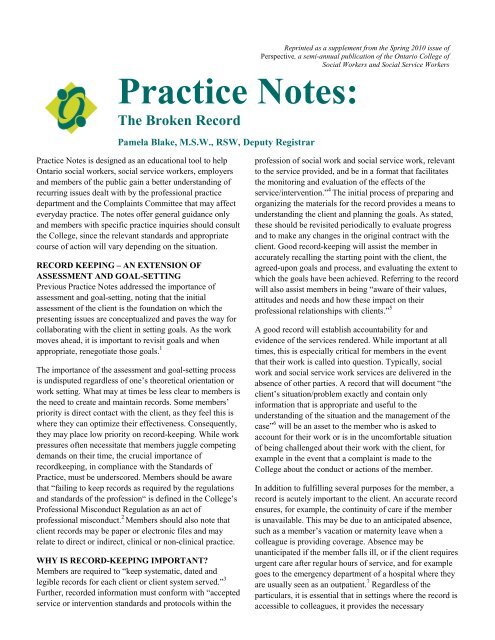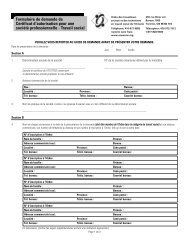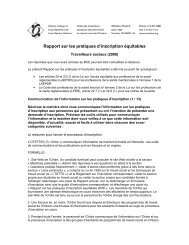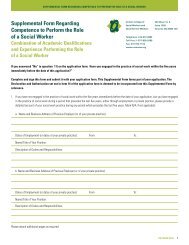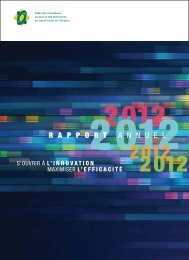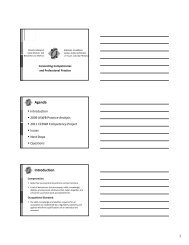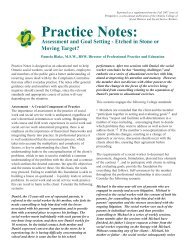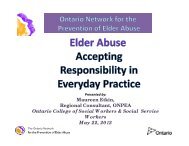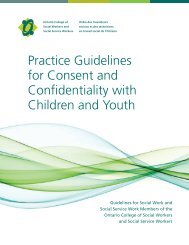Record Keeping - Ontario College of Social Workers and Social ...
Record Keeping - Ontario College of Social Workers and Social ...
Record Keeping - Ontario College of Social Workers and Social ...
Create successful ePaper yourself
Turn your PDF publications into a flip-book with our unique Google optimized e-Paper software.
Reprinted as a supplement from the Spring 2010 issue <strong>of</strong><br />
Perspective, a semi-annual publication <strong>of</strong> the <strong>Ontario</strong> <strong>College</strong> <strong>of</strong><br />
<strong>Social</strong> <strong>Workers</strong> <strong>and</strong> <strong>Social</strong> Service <strong>Workers</strong><br />
Practice Notes:<br />
The Broken <strong>Record</strong><br />
Pamela Blake, M.S.W., RSW, Deputy Registrar<br />
Practice Notes is designed as an educational tool to help<br />
<strong>Ontario</strong> social workers, social service workers, employers<br />
<strong>and</strong> members <strong>of</strong> the public gain a better underst<strong>and</strong>ing <strong>of</strong><br />
recurring issues dealt with by the pr<strong>of</strong>essional practice<br />
department <strong>and</strong> the Complaints Committee that may affect<br />
everyday practice. The notes <strong>of</strong>fer general guidance only<br />
<strong>and</strong> members with specific practice inquiries should consult<br />
the <strong>College</strong>, since the relevant st<strong>and</strong>ards <strong>and</strong> appropriate<br />
course <strong>of</strong> action will vary depending on the situation.<br />
RECORD KEEPING – AN EXTENSION OF<br />
ASSESSMENT AND GOAL-SETTING<br />
Previous Practice Notes addressed the importance <strong>of</strong><br />
assessment <strong>and</strong> goal-setting, noting that the initial<br />
assessment <strong>of</strong> the client is the foundation on which the<br />
presenting issues are conceptualized <strong>and</strong> paves the way for<br />
collaborating with the client in setting goals. As the work<br />
moves ahead, it is important to revisit goals <strong>and</strong> when<br />
appropriate, renegotiate those goals. 1<br />
The importance <strong>of</strong> the assessment <strong>and</strong> goal-setting process<br />
is undisputed regardless <strong>of</strong> one’s theoretical orientation or<br />
work setting. What may at times be less clear to members is<br />
the need to create <strong>and</strong> maintain records. Some members’<br />
priority is direct contact with the client, as they feel this is<br />
where they can optimize their effectiveness. Consequently,<br />
they may place low priority on record-keeping. While work<br />
pressures <strong>of</strong>ten necessitate that members juggle competing<br />
dem<strong>and</strong>s on their time, the crucial importance <strong>of</strong><br />
recordkeeping, in compliance with the St<strong>and</strong>ards <strong>of</strong><br />
Practice, must be underscored. Members should be aware<br />
that “failing to keep records as required by the regulations<br />
<strong>and</strong> st<strong>and</strong>ards <strong>of</strong> the pr<strong>of</strong>ession“ is defined in the <strong>College</strong>’s<br />
Pr<strong>of</strong>essional Misconduct Regulation as an act <strong>of</strong><br />
pr<strong>of</strong>essional misconduct. 2 Members should also note that<br />
client records may be paper or electronic files <strong>and</strong> may<br />
relate to direct or indirect, clinical or non-clinical practice.<br />
WHY IS RECORD-KEEPING IMPORTANT<br />
Members are required to “keep systematic, dated <strong>and</strong><br />
legible records for each client or client system served.” 3<br />
Further, recorded information must conform with “accepted<br />
service or intervention st<strong>and</strong>ards <strong>and</strong> protocols within the<br />
pr<strong>of</strong>ession <strong>of</strong> social work <strong>and</strong> social service work, relevant<br />
to the service provided, <strong>and</strong> be in a format that facilitates<br />
the monitoring <strong>and</strong> evaluation <strong>of</strong> the effects <strong>of</strong> the<br />
service/intervention.” 4 The initial process <strong>of</strong> preparing <strong>and</strong><br />
organizing the materials for the record provides a means to<br />
underst<strong>and</strong>ing the client <strong>and</strong> planning the goals. As stated,<br />
these should be revisited periodically to evaluate progress<br />
<strong>and</strong> to make any changes in the original contract with the<br />
client. Good record-keeping will assist the member in<br />
accurately recalling the starting point with the client, the<br />
agreed-upon goals <strong>and</strong> process, <strong>and</strong> evaluating the extent to<br />
which the goals have been achieved. Referring to the record<br />
will also assist members in being “aware <strong>of</strong> their values,<br />
attitudes <strong>and</strong> needs <strong>and</strong> how these impact on their<br />
pr<strong>of</strong>essional relationships with clients.” 5<br />
A good record will establish accountability for <strong>and</strong><br />
evidence <strong>of</strong> the services rendered. While important at all<br />
times, this is especially critical for members in the event<br />
that their work is called into question. Typically, social<br />
work <strong>and</strong> social service work services are delivered in the<br />
absence <strong>of</strong> other parties. A record that will document “the<br />
client’s situation/problem exactly <strong>and</strong> contain only<br />
information that is appropriate <strong>and</strong> useful to the<br />
underst<strong>and</strong>ing <strong>of</strong> the situation <strong>and</strong> the management <strong>of</strong> the<br />
case” 6 will be an asset to the member who is asked to<br />
account for their work or is in the uncomfortable situation<br />
<strong>of</strong> being challenged about their work with the client, for<br />
example in the event that a complaint is made to the<br />
<strong>College</strong> about the conduct or actions <strong>of</strong> the member.<br />
In addition to fulfilling several purposes for the member, a<br />
record is acutely important to the client. An accurate record<br />
ensures, for example, the continuity <strong>of</strong> care if the member<br />
is unavailable. This may be due to an anticipated absence,<br />
such as a member’s vacation or maternity leave when a<br />
colleague is providing coverage. Absence may be<br />
unanticipated if the member falls ill, or if the client requires<br />
urgent care after regular hours <strong>of</strong> service, <strong>and</strong> for example<br />
goes to the emergency department <strong>of</strong> a hospital where they<br />
are usually seen as an outpatient. 7 Regardless <strong>of</strong> the<br />
particulars, it is essential that in settings where the record is<br />
accessible to colleagues, it provides the necessary
information to enable another pr<strong>of</strong>essional to provide<br />
quality care to the client. Members will periodically refer<br />
their client to another pr<strong>of</strong>essional for a consultation or<br />
when the member determines that the client’s needs fall<br />
outside the member’s competence or usual area <strong>of</strong> practice.<br />
With the client’s consent to disclose information, an<br />
accurate <strong>and</strong> up to date record will assist the member in<br />
making an effective referral on the client’s behalf.<br />
While the record may be seen as important only in the<br />
present, members should bear in mind that recorded<br />
information can have importance for the client for many<br />
years to come. A former client who seeks help from<br />
another pr<strong>of</strong>essional in the future may benefit greatly when<br />
their record is shared, with their consent, with their new<br />
service provider.<br />
WHAT AND WHEN DO I RECORD<br />
Members frequently turn to the <strong>College</strong> for direction about<br />
the specific content <strong>of</strong> the record such as, for example,<br />
what should be included in a psychosocial assessment.<br />
Members will find ample guidance in the St<strong>and</strong>ards <strong>of</strong><br />
Practice regarding what documents <strong>and</strong> information can be<br />
included in a record <strong>and</strong> what an accurate record will<br />
contain. 8 However, the specifics <strong>of</strong> the record will be<br />
determined by many factors including the nature <strong>and</strong><br />
setting <strong>of</strong> the member’s work, the purpose <strong>of</strong> the contact<br />
<strong>and</strong> the member’s judgment about what is relevant to<br />
underst<strong>and</strong>ing the client’s situation <strong>and</strong> should therefore be<br />
included. For example, the content <strong>of</strong> an initial assessment<br />
<strong>of</strong> a woman seeking psychotherapy to address her history<br />
<strong>of</strong> trauma will differ from an assessment <strong>of</strong> a client’s<br />
eligibility for subsidized housing, though both will be<br />
expected to meet the guidelines contained in the St<strong>and</strong>ards<br />
<strong>of</strong> Practice.<br />
Members must also exercise judgment regarding the<br />
wording they choose to document the client’s situation <strong>and</strong><br />
are reminded to “report impartially <strong>and</strong> objectively the<br />
factors relevant to the client’s situation. The record clearly<br />
distinguishes the <strong>College</strong> member’s observations <strong>and</strong><br />
opinions from the information reported by the client”. 9<br />
Members from time to time ask for direction about how<br />
soon after they provide service they must complete their<br />
recording. The St<strong>and</strong>ards <strong>of</strong> Practice state that “information<br />
is recorded when the event occurs or as soon as possible<br />
thereafter”. 10 Here again the member must exercise<br />
pr<strong>of</strong>essional judgment regarding the timeliness <strong>of</strong> their<br />
recording, taking into consideration the nature <strong>of</strong> the<br />
contact <strong>and</strong> any legislated requirements or organization<br />
policy. A member whose client presents with suicidal<br />
ideation clearly has an immediate obligation to document<br />
the nature <strong>of</strong> the contact, their assessment <strong>and</strong> disposition<br />
<strong>and</strong> any other relevant information, while a member<br />
working with a community group on a funding proposal<br />
may not have the same kind <strong>of</strong> time requirements.<br />
CONCLUSION<br />
<strong>Record</strong>-keeping is an essential component <strong>of</strong> pr<strong>of</strong>essional<br />
practice. A record helps the member to underst<strong>and</strong> the<br />
client <strong>and</strong> set goals for the intervention, ensures continuity<br />
<strong>and</strong> quality <strong>of</strong> services, establishes accountability for <strong>and</strong><br />
evidence <strong>of</strong> the services provided <strong>and</strong> enables the<br />
evaluation <strong>of</strong> service quality. <strong>Record</strong>s also may provide<br />
information to be used in research <strong>and</strong> education, subject to<br />
any applicable privacy or other legislation. <strong>Keeping</strong> records<br />
in compliance with the St<strong>and</strong>ards <strong>of</strong> Practice is a necessity.<br />
<strong>Keeping</strong> a good record is an asset to both the client <strong>and</strong> the<br />
member.<br />
Members are encouraged to review Principle IV, The<br />
<strong>Social</strong> Work <strong>and</strong> <strong>Social</strong> Service Work <strong>Record</strong> in its<br />
entirety. For more information, please contact the<br />
Pr<strong>of</strong>essional Practice Department at 416-972-9882 or 1-<br />
877-828-9380.<br />
1<br />
Practice Notes: Assessment <strong>and</strong> Goal-Setting – Etched in Stone or<br />
Moving Target Perspective Fall 2007<br />
2<br />
Paragraph 20 <strong>of</strong> section 2, O. Reg. 384/00 (Pr<strong>of</strong>essional<br />
Misconduct), made under the <strong>Social</strong> Work <strong>and</strong> <strong>Social</strong> Service Work<br />
Act, 1998.<br />
3 Code <strong>of</strong> Ethics <strong>and</strong> St<strong>and</strong>ards <strong>of</strong> Practice, Second Edition 2008,<br />
Principle IV, interpretation 4.1.3<br />
4 Code <strong>of</strong> Ethics <strong>and</strong> St<strong>and</strong>ards <strong>of</strong> Practice, Second Edition 2008,<br />
Principle IV, interpretation 4.1.1<br />
5 Code <strong>of</strong> Ethics <strong>and</strong> St<strong>and</strong>ards <strong>of</strong> Practice, Second Edition 2008,<br />
Principle I, interpretation 1.5<br />
6<br />
Code <strong>of</strong> Ethics <strong>and</strong> St<strong>and</strong>ards <strong>of</strong> Practice, Second Edition 2008,<br />
Principle IV, footnote 2. a)<br />
7<br />
According to the Code <strong>of</strong> Ethics <strong>and</strong> St<strong>and</strong>ards <strong>of</strong> Practice,<br />
members inform clients early in their relationship <strong>of</strong> any limits <strong>of</strong><br />
client confidentiality, including with respect to the client record. See<br />
Principle IV, interpretation 4.4.1 <strong>and</strong> Principle V, interpretation 5.4.<br />
8<br />
Code <strong>of</strong> Ethics <strong>and</strong> St<strong>and</strong>ards <strong>of</strong> Practice, Second Edition 2008,<br />
Principle IV, footnotes 1, 2 <strong>and</strong> 3<br />
9 Code <strong>of</strong> Ethics <strong>and</strong> St<strong>and</strong>ards <strong>of</strong> Practice, Second Edition 2008,<br />
Principle IV, footnote 2 b)<br />
10<br />
Code <strong>of</strong> Ethics <strong>and</strong> St<strong>and</strong>ards <strong>of</strong> Practice, Second Edition 2008,<br />
Principle IV, interpretation 4.1.6


